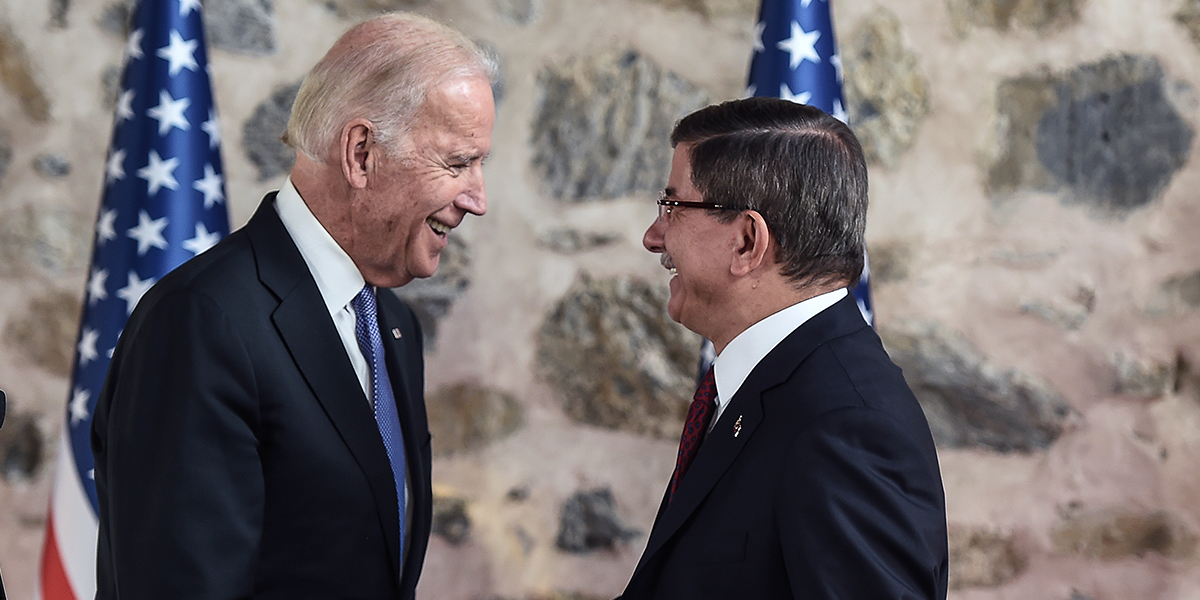
Turkish-US Relations: Strangling Strategy With Tactics
Share
In the past week, undoubtedly one of the most important matters on the agenda of Turkish politics was U.S. Vice President Joe Biden's visit. Above all else, Biden's visit was important in terms of evaluating the potential for collaboration between the U.S. and Turkey on Middle Eastern politics in general and, more specifically, on Syria and Iraq, as well as negotiations regarding the various differences of opinion. Discussions on what Biden might have in his dossier had already begun before he arrived. The general idea was that Biden and Turkish officials would discuss the topics of the struggle with DAESH, Turkish-Russian relations, the status of the Democratic Union Party (PYD), the structure of the Bashiqa camp, border security and a new train-and-equip program. Indeed, Biden came and met first with Prime Minister Ahmet Davutoğlu and President Recep Tayyip Erdoğan to speak about these topics.However, the other factor that made Biden's visit interesting and media-focused was the frequency of his visits. Biden only met with the radical opposition, where opposition to Erdoğan is at the center of political discourse, causing many debates. The journalists who attended these meetings gleefully chose to interpret this as a victory won over Erdoğan. The fact that Biden drew attention to the freedom of the press and the freedom of expression in this meeting, where he stressed the message that there must not be capitulations on the freedoms of the press and expression, is significant.
Notably, the political message behind Biden's sole acceptance of journalists who oppose Erdoğan as his respondents is obvious. Biden and American decision makers are aware of the administrative fight ongoing in Turkish politics as well as how this fight is reflected in the media. The socio-political opposition representatives Biden met with are those who have made their opposition to Erdoğan an identity, even an obsession. They include those who supported, whether openly or clandestinely, the Gezi protests, the Dec. 17 and Dec. 25 coup attempts on the part of the Gülen Movement and, later, regarding the new struggle instigated by the PKK terror organization against the state for the purpose of bringing Erdoğan's administration down. Under the headlines of "the freedom of the press" and freedom of expression, at the center of the invisible political struggle therein lies the obstruction of political normalization and the transformation that is occurring with Erdoğan's leadership. This naked truth is a situation known quite well by the actors who know and recognize Turkey. Of course, Biden and those who arranged his program know this quite well, too.
So, why did Biden lean toward such a symbolic stance against Erdoğan's? The reason for this is not the U.S.'s supposed keen interest in Turkey's problems regarding the freedom of the press. U.S.-Turkish relations have a long past, and modern Turkish history is full of incomparably heavy obstacles to the freedom of expression and the press when compared to today. Within this historical process, we all know that the U.S. did not engage in symbolic intervention in Turkey through rhetoric advocating for the freedom of expression. Another thing we know is that, for the U.S., when its own national interests are the point in question, the U.S. throws the topics of freedom of expression and freedom of the press out the window. However, what is more important is that the U.S. uses the rhetoric of freedom of expression and the freedom of the press in its foreign policy processes in countries that U.S. officials want to convince to take a certain position or to impose a new situation.
Then, in this case, what is the new position that the U.S. wants to convince Turkey of or that the U.S. wants to impose on Turkey? The U.S.'s main concern is making Turkey more influential in the struggle against DAESH. At this point, the U.S. is asking that Turkey take on much more responsibility in that regard. Despite the fact that Turkey considers DAESH a terrorist organization and is fighting DAESH both inside and outside the country, the U.S. is still asking that Turkey contribute much more.
The most fundamental issue for the U.S. is that Turkey regards DAESH as the upmost threat and must mobilize its military capacity against it. Another dimension is that, from the U.S.'s perspective, Turkey should not regard the PYD and its armed People's Protection Units (YPG), which the U.S. sees as the primary ground forces used in the struggle against DAESH, as a threat. Ankara's main point of concern during this process has been that the PYD is the PKK's extension in Syria and the guns given to the PYD and YPG are being used in PKK terror attacks in Turkey.
Davutoğlu and Erdoğan both clearly explained Turkey's approach to the PKK and the PYD in their meetings with Biden. In response, Biden reaffirmed that the PKK is a terror organization like DAESH; however, the U.S. will work together with the PYD. There is a crucial point that American decision makers must realize. The more successful Turkey is in its struggle against the PKK, the more likely it is to successfully fight against DAESH. During this period, it is paramount to stop giving the PYD, also known as the PKK's Syrian extension, various tactical realities and privileged positions. U.S. foreign policy makers must stop strangling strategy with tactics.
[Daily Sabah, January 29, 2016]
Tags »
Related Articles






